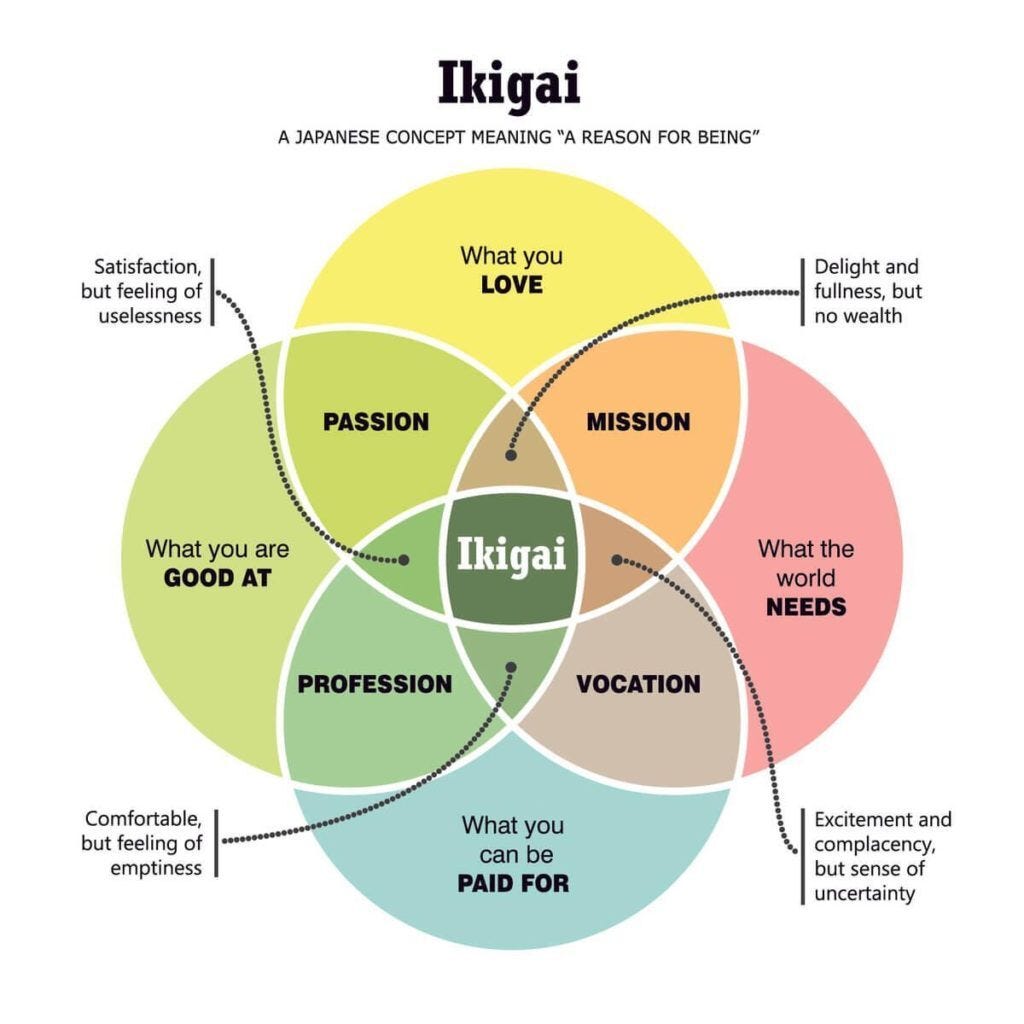Ambitious person: all the ways you could orient your life
For the past year I’ve kept in the back of my mind a question: what are all the ways an ambitious person could approach their life?
I’ve brought it up in conversation. It’s been in my mind with all reading. I’ve had a year-long brainstorm.
The result: I think there are 34 ways ambitious people, consciously or not, approach their lives.
Some approaches have advantages. Some are downright bad.
I’ve assembled the below list as something of a menu, or thinking tool. A way for one to ponder the different ways their future could be pursued.
My hope is it helps readers a) think more expansively about all possible ways their future could be directed, and b) to gain greater awareness of underlying motivations.

The approaches
1. Best next thing. At every juncture in life, assess the options before you. No grand plan required; just go for each successive best option.
This is a great way to gain altitude – and I think a good way to begin a career. But it comes with a long-term downside (30 seconds):
A ‘local maximum’: golden-handcuffs tied to success, and the possible need to climb down before further scaling.
2. Join the best team you can. Surround yourself with winners, and let that rub off on you.
3. Get rich / accumulate wealth / make as much money as you can.
4. Mastery. Pick one thing, and become one of the best in the world at it. Do something never done before. I will include here: going after the most intellectually rigorous problem you can.
5. Build an enterprise. Devote your life to an institution/company/organisation. Build something larger than you. At its most ambitious, start a new country.
6. Have the mightiest impact you can. (30 seconds)
‘Enormous leverage on the system.’ Or Napoleon at age 26: ‘I no longer considered myself a mere general, but a man called upon to decide the fate of peoples.’
7. Fun – optimise for that. Both in an immediate hedonistic sense, and being calculating in acquiring capital/access to maximise it long-term.
8. Eudaimonia. Live virtuously. Become the best individual you can. Mastery of self.
9. Focus on what you’re best at. What are you best at? Put the majority of your resources into that. 10 seconds:
‘We have some random allocation of talent. Figure out what you’re relatively good at, and try to do that well.’ What’s your edge?
10. Pursue what you’re most interested in. What bizarre resource allocation to have so many people spending so much of their lives on things so profoundly uninteresting to them. Do what you’re engrossed by. Engagement. Flow. Allow this to change/evolve as your interests do.
11. Start a dynasty. On Joseph P. Kennedy (10 seconds):
And (50 seconds):
12. ‘I had to do it’. There’s an experience many people report (I have experienced several times) of being ‘possessed’ to do something / follow an opportunity. Whenever this occurs, assume there’s a higher wisdom in your instincts and whatever drives it.
13. Do a lot of different things sequentially. Paddy Ashdown: Marine/SBS, studied Mandarin, spy/diplomat, political party leader, foreign peace broker, wrote 11 history books. George Osborne: MP, Chancellor, newspaper editor, banker… Stewart Brand with his many varied careers (15 seconds):
‘When you can do the thing you’re doing in your sleep, wake up.’
14. Focus on having the best family life possible. Not building a dynasty, but being the best mum/dad/wife/husband/daughter/son.
15. Lift where you stand. Make a conscious effort to help those immediately around you. Friends/family/city. Cultivate locally. Likely underrated today with so many people thinking they have to ‘change the world’. At its most ambitious, this might include patriotism and serving your country.
16. Lieutenant. Find someone whose mission you so belief in you can devote yourself to helping them. Rather than ask ‘what do I want to do?’, ask ‘who do I want to help?’
17. Build the future. Pursue the cutting edge. Catalyse technological advancement and perhaps capitalise on an opportunity from it.
18. Collect experiences. Live shows. Concerts. Travel. Moments with friends. Bucket list.
19. Big world problem. Martin Luther King Jr: ‘If a man hasn’t found something he will die for, he isn’t fit to live.’ Contribute to the <biggest * most neglected> problem you can identify, that you are able to contribute to. Effective Altruism. ‘To be or to do?’
20. Long-termism. Help affect as much good as you can, factoring future generations into your calculations. Work to defuse existential risks to humanity.
21. Pursue a particular position. Maybe it’s Prime Minister. Perhaps CEO of a particular company. This from Strauss Zelnick is one of the best few minutes I’ve come across of someone articulating their internal career decision-making process (for 3 minutes):
22. Self promotion/aggrandisement. Optimise for your own prestige/notoriety. I include here aspirations of both fame and ‘legacy’.
23. Follow your parents’ wishes. Enough people do this it has to be included in such a list.
24. Compete with one person. As friendly/productive examples: Federer/Nadal. Lennon/McCartney, always trying to outdo each other’s songwriting. Turned sour, this can become an actual pursuit of revenge: Ice Cube in Straight Outta Compton. Andrew Carnegie and Henry Clay Frick. Charlie Munger: ‘It’s not greed that drives the world, but envy.’
25. Regret minimisation. What would you most regret not having done? 30 seconds:
I’m not sure this can be a guiding principle for your entire life, but it might help drive decisions for several years, if there’s something you really want to do.
26. Sovereign individual. Optimise for self-sufficiency. Water/food/energy sovereign. Completely off-grid. Spun in an adventurous way, Into the Wild.
27. Follow societal convention. Done well: maximise your career standing in one esteemed area, and balance lots of things: good health/good family… Negatively put: mindlessly going along with what you’re encouraged to do, and keeping up with the Joneses.
28. Religious calling. If religious: what you consider the Almighty wants you to do. Propagation of your faith. At its most ambitious, being a religious revolutionary e.g. Ignatius of Loyola.
29. The Tao. ‘Therefore the one thing we must do, said Lao-tzu, is: do nothing. Be still within ourselves. Neither look nor listen to anything around us, have no wishes or opinions. Only when a person has become like a tree or a flower, empty of all will or purpose, will he begin to feel the Tao – that great universal law which makes the heavens turn and brings the spring – begin to work within him.’ I’m going to lump here solitude. Walden.
30. Coach/nurture others. Bill Campbell. Arguably Peter Thiel in a capacity too. You could extend this to sports and Bill Belichick/Nick Saban/Sir Alex Ferguson. Talent spot and increase aspirations. Fellowships. Venture capital.
31. Righting a wrong. Fighting a cause. A historian called Angie Debo dedicated her life to investigating and reporting the truth of what happened to native Americans in Oklahoma – which many had tried to airbrush from history.
32. Build your résumé. Concern yourself with the perception of how you will come across to future gatekeepers – above and beyond what you’ll enjoy the most, or even where you’ll have most impact. Credentials.
33. Upskill. Where are you going to learn the most? What skills are rare and valuable? Where will you acquire the most ‘career capital’?
34. Create a masterpiece. The Sistine Chapel. Tolstoy and War and Peace. Jony Ive and any of his designs for Apple. Create something you hope to live on for generations.
My thoughts on all this…
I) You can sequence approaches. E.g. Get rich, then work on a big world problem.
Sam Altman does not favour this common strategy (90 seconds):
And (also 90 seconds):
II) There’s a book called Obliquity, the thesis of which is: pursuing something directly is often a very bad/sub-optimal way of achieving it.
Chase wealth and you’ll likely be less rich than someone who solves a big world problem. Chase experiences and you won’t get invitations to the kinds of thing someone who’s founded a great company will.
When thinking about your approach, try to gauge second-order consequences and which routes unlock secondary benefits.
III) Running a few notable figures through the list...
Steve Jobs
10. Pursue what you’re most interested in
12. ‘I had to do it’ (following instinct; letting the dots join up later)
17. Build the future
5. Build an enterprise
Benjamin Franklin
8. Eudaimonia
3. Get rich
13. Do a lot of different things sequentially
17. Build the future
15. Lift where you stand / 19. Big world problem
22. Self promotion/aggrandisement
Tiger Woods
23. Follow your parents’ wishes
9. Focus on what you’re best at
4. Mastery
22. Self promotion/aggrandisement
7. Fun
Sheryl Sandberg
1. Best next thing
2. Join the best team you can
5. Build an enterprise
16. Lieutenant
17. Build the future
31. Righting a wrong
Conor McGregor
10. Pursue what you’re most interested in
9. Focus on what you’re best at
4. Mastery
3. Get rich
22. Self promotion/aggrandisement
Beware any attempt to psychoanalyse from a distance, but it’s interesting that you can reasonably assign roughly five to each.
For an exercise in self reflection: what would a future pursuing each one look like?Choose five from the list that most resonate with you, then ask yourself: how closely am I living by them?
IV) There’s a Japanese concept several books have been written about called Ikigai.
I like this. (I don’t think just another trite self-help graphic.) But I would consider it something of a ‘pre-made’ combination. You don’t have to pick those four elements as building blocks. Create your own custom combination by choosing from an exhaustive list, and give your own weighting of importance to each element.
Think independently. Ignore others.
Ryan Holiday wrote a memorable piece in 2014:
‘The Greek word euthymia… the belief that you’re on the right path and not led astray by the many tracks which cross yours of people who are hopelessly lost.’
Friends, and people around you, may go on and become billionaires/Prime Ministers/other source of great status – which could easily cause pangs of envy. To minimise this, you need to discern your own path, and recurrently remind yourself why you’ve rejected the others.
Go through the exercise. What combination of ~five could work for you?




